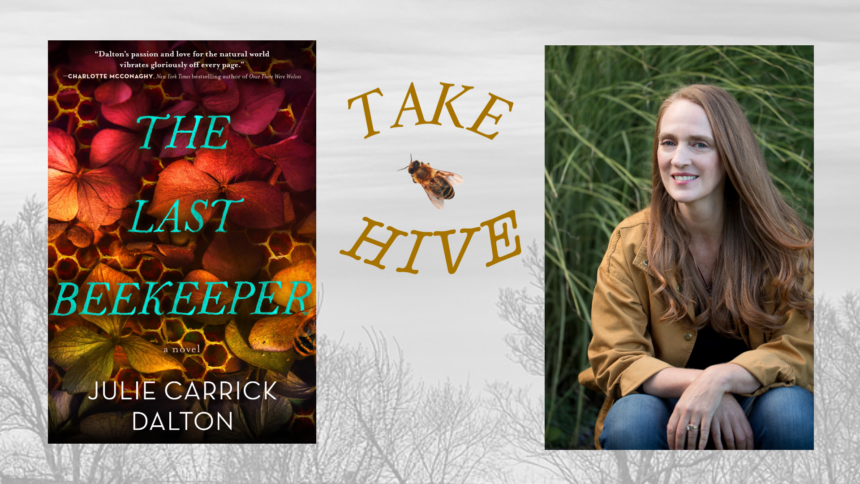Take 5: Julie Carrick-Dalton and THE LAST BEEKEEPER
By Writer Unboxed | March 5, 2023 |
Writer Unboxed contributor Julie Carrick-Dalton‘s second novel, The Last Beekeeper, releases in just two days, on March 7th, and we are thrilled to help her celebrate its release.
Julie’s debut, Waiting for the Night Song, was named a Most Anticipated Book by CNN, Newsweek, USA Today, and Parade, and was an Amazon Editor’s Pick for Best Book of the Month. A Bread Loaf, Tin House, and GrubStreet Novel Incubator alum, she holds a Master’s in Creative Writing and Literature from Harvard Extension School. With a background in farming and beekeeping, she is a frequent speaker on the topic of ‘fiction in the age of climate crisis’ at universities, museums, libraries, and conferences. Julie is the winner of the William Faulkner Literary Competition and the Writers League of Texas Award for contemporary fiction, and was a finalist for the Silver Falchion Award for best suspense novel, the Caledonia Novel Award, and the WFWA Star Award for best debut novel. Her writing has appeared in The Boston Globe, BusinessWeek, Orion, Electric Literature, Lit Hub, Chicago Review of Books, and other platforms.
What is The Last Beekeeper about? Read on! And congratulations, Julie!
Q: What’s the premise of your new book?
JCD: The Last Beekeeper is a near-future novel about the tenuous relationship between a beekeeper and his daughter as the world’s pollinator population collapses. The loss of our pollinators launches the world into an agricultural and food security crisis, which leads to economic and political instability. The story centers on Sasha, the daughter of the infamous Last Beekeeper. She carries guilt and grief over the loss of the last bee colony, which she believes she caused. Adrift in the world after her father goes to prison for his involvement with an unsanctioned beekeeping operation, Sasha returns to her childhood home to search for her father’s missing research in the hope of finding out why he chose prison over her and to learn what her own involvement in the Great Collapse really was. Along the way, Sasha falls in with a group of young people squatting in her abandoned childhood farmhouse. She soon imagines building a future with this found family. Maybe she should let the past stay buried. But when Sasha thinks she sees a bee —an extinct bee—she wonders if she is losing her grip on reality. Chasing down her imagined bee could threaten the safety of her new family—or it could save them all.
Q: What would you like people to know about the story itself?
JCD: The premise of The Last Beekeeper sounds dark, but it is infused with my love of nature, bees in particular, and my insistence on believing in hope. I will always leave room for hope. Several years ago I lost two colonies of bees due to toxic chemicals a neighbor applied to their lawn. It made me wonder how the native pollinators were doing. Did they die too? What if all of our pollinators died? That ‘what if’ question gave birth to The Last Beekeeper. The premise is speculative, but based on real science. Sadly, my ‘what if’ is not that far-fetched.
Q: What do your characters have to overcome in this story? What challenge do you set before them?
JCD: All of the main characters—Sasha and the group of squatters who befriend her—have been displaced for various reasons. Cast out by family. They lost their family. Searching for their family. They are adrift in an unstable world that is changing rapidly. Each of them carries their own wounds and grief and hope for the future. I wanted to isolate these characters together in this abandoned farmhouse and force them to confront an existential crisis. How would they each respond? Who would rise up? Who would crumble? They all surprised me in different ways. Writing this band of characters was the most fun I’ve ever had writing. I love each of them so much.
Q: What unique challenges did this book pose for you, if any?
JCD: Like my first book, Waiting for the Night Song, The Last Beekeeper is a dual timeline narrative. I struggled with one of the timelines in The Last Beekeeper so much that I ended up throwing it out and starting over after revising the original version three times. I couldn’t figure out what was wrong until my editor noted that writing scenes in cities is not my strength. ‘Get those characters outside, get them in the woods, in the dirt,’ she advised. But that meant ditching half of the book. In the original version, my characters lived in the city, but longed desperately to be out in nature. I thought all that the longing would my characters complicated. But really, it just made them static and annoying. So I packed their bags and moved them to an abandoned farmhouse in the middle of nowhere, surrounded by woods and fields. Ahhhhhh, I thought. This is where they belong. I started that second timeline over in the new location and the writing came fast and furious. Maybe one day I’ll master writing scenes in cities (I live in an apartment downtown Boston. I should be able to figure this out!) But for now, I’ll stick to the wild places where my writing heart lives.
Q: What has been the most rewarding aspect of having written this book?
JCD: I love the characters in this book so much! They feel more real to me than any other characters I’ve ever written. I find myself thinking about them a lot. What are they doing now? Where are they? Are they happy? I’m pretty sure they are happy. Are they together? I hope so. Are they safe? I think it’s a bit like parenting. The kids grow up and move out, but you never stop worrying about them. Sasha and her friends are in their early twenties at the end of the book, with so much ahead of them, so much to look forward to, so much to fear. I have faith that they will find their way in the unstable world I created for them. I’m so proud of these characters, but I’d be lying if I said I didn’t miss them. I wish they would send me a postcard letting me know they are okay. Just a short note. Is that asking too much?
You can learn more about Julie’s works by visiting her website. And stay tuned: Julie recently signed another contract with Forge Books, Macmillan, for two more novels! Congratulations again, Julie!











Congratulations on the release of your new book, which sounds awesome. And thanks for sharing about your difficulty with writing in certain settings and your willingness to make the changes. That is no small thing! Also, I’m sorry about the loss of your bees. But from the description of your story, it sounds like you tuned that loss into a much larger win, for yourself, your readers, and the planet!
Thank you, Susan! I love idea of turning a loss into a win. I haven’t given up on the bees. In fact, I’m getting a new hive in April!
This sounds fascinating Julie. It is endlessly fascinating how often our preconceived notions of a story develop early in plotting a story and the tenacity and bold moves required to set our characters free during revisions. Lucky you to have a wise editor you respect on your side. I admire so much the work you have done and your success creating characters you want to “mom.” Sounds like the door could be open to revisiting them in there 30s and 40s. Hopefully their world may see a breath or two of fresh air and new growth in their lifetime. Looking forward to reading.
You certainly have me hooked, Julie! “The last beekeeper” is on my list now! Wishing you lots of luck with the book launch and many, many readers!
That bit about having to get your characters out of the city because you write country settings best is so interesting!
Congrats on the new book. <3